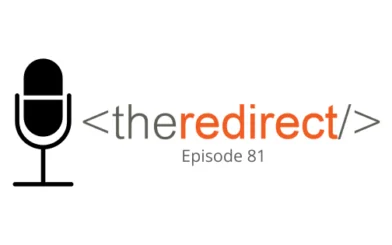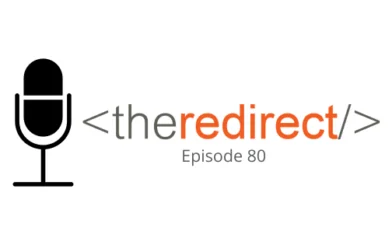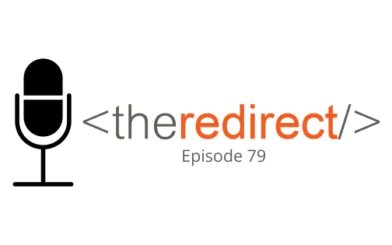Episode 40 / March 30, 2018
Listen now:
Welcome to The Redirect Podcast, where the BlackTruck team shares recent insights and takeaways from the world of search marketing.
In this week’s episode:
- Was there another Google algorithm update on March 28? (begins at 1:05)
- Google officially announces that the mobile-first index has started to roll out at scale (begins at 2:00).
- Updates on Google My Business and Google Maps. (begins at 5:19).
- We know reviews can play a major part in your local SEO strategy, but who polices the gamification of Google Local Guides? (begins at 11:26).
- Out of SearchLove San Diego: Reverse-Engineering YouTube Search (begins at 16:25).
- What should be your starting point for content marketing? (begins at 24:05).
- How quickly can you see improvements in search from SEO work performed on a website? (begins at 29:52)
Google Rolls Out Mobile-First Indexing
Google officially has gone on the record and stated that it’s rolling out mobile-first indexing. This comes after a year and a half of testing and of course taunting to the SEO community. Google states that they’re rolling out indexing to include sites that follow best practices for mobile-first indexing.
“Sites that are not in this initial wave don’t need to panic. Mobile-first indexing is about how we gather content, not about how content is ranked. Content gathered by mobile-first indexing has no ranking advantage over mobile content that’s not yet gathered this way or desktop content. Moreover, if you only have desktop content, you will continue to be represented in our index.”
Keep monitoring your Google Search Console messages to find out if your site has been included in the mobile-first indexing.
Further reading in Episode 34 ft. Cindy Krum, and in a recent article from The SEM Post.
More New Features in Google Maps
With the latest update of the Google Maps app for iOS, there are two new updates: Average wait time shown in real time, and the ability to search through reviews and filter by relevancy, newest reviews, highest/lowest ratings, etc., even filtering within a search within those reviews. A hat tip to Matt Southern for sharing this update on Search Engine Journal.
We talked about how keywords in user reviews can help with local SEO in Episode 24. With reviews now being searchable themselves, keywords can also help viewers looking for information on specific facets of your business.
We recommend creating a system for asking for customer reviews that includes sending an email asking for feedback, including a direct link to where they can leave a review. Make it easy for them to write the review, more helpful for future viewers, and ultimately beneficial for you, by suggesting they leave feedback on their experience with a specific product, service, location, etc. For instance, “Please include your experience with parking.” If the reviewer uses the language you provided in your request, all the better for people who are looking for information in specific areas.
In Episode 38, we mentioned that descriptions were coming back for Google My Business listings. This will show up in your Google Knowledge Panel in a section called “From the Business.” Take advantage of this opportunity to speak directly to your audience by completing this section in your Google My Business info.
We also discussed Google Local Guides and the possibility of them “gaming the system.”
Optimizing YouTube Videos
In Episode 37, Adrienne posed the question of how video creators can optimize them for search. At SearchLove San Diego, Justin Briggs presented on Reverse Engineering YouTube Search, digging deep into ranking factors to consider when optimizing videos. View his slidedeck on SlideShare.
Where Should Content Marketing Start?
Rand Fishkin recently wrote an article on SparkToro’s blog called, “Don’t Start Your Content Marketing with ‘What Do My Customers Want?’”
He argues that if you approach your content marketing with that question, you’ll be talking to people who are already “in your funnel.” His position is that as a business, it can be beneficial to reach people outside the funnel who need to be made aware that you exist.
He says it’s a better idea to create content for “journalists, podcasters, authors, amplifiers, influencers, and media” to reach your audience. This is more likely to achieve your marketing goals.
Outreach and creating content to submit to publications is definitely part of an SEO’s work, and so in that sense I agree with Rand. But when I think about the approach we use in keyword research, we aren’t only targeting existing customers; if we’re doing it right, we are looking for opportunities to reach a wider, relevant audience through the selection of keywords and building content to answer questions that aren’t currently being answered, etc.
A big part of the argument is the distinction Rand makes between “customer-centric content” that is perhaps better for e-newsletters and in-product content, vs. “external-focused content,” which is what he says the focus should be.
At the end of the day, he’s building a tool for influencer and audience intelligence, so his recommendation is not surprising – nor is wrong in any way, shape, or form.
In the comments of the article, readers suggest a small shift, that the sentiment could instead be, “Don’t start ALL your content marketing…” or “Don’t ALWAYS start your content marketing with, ‘What do my customers want?’” Jason breaks it down further beginning at 27:45.
How Quickly Does SEO “Work”?
A question we often get is, “How quickly will we see improvements from any type of SEO work?” This is always a difficult one to answer, as there are so many factors that come into play – anything from the volatility and movement within the industry vertical to the age/history of the domain, etc.
But what about major changes to a site? As The SEM Post’s Jennifer Slegg pointed out recently, it can take 6 months or more to see rankings improve in this case.
Google’s John Mueller is saying major changes like this can take “months,” sometimes up to half a year, to see those results. That’s not to say you should refrain from producing new content or strategy in this time frame; it’s just a reminder that significant changes to a site can take time to manifest improvements in organic search.
Thanks for tuning in! To catch future episodes of The Redirect Podcast, subscribe on SoundCloud, iTunes, or Stitcher.




